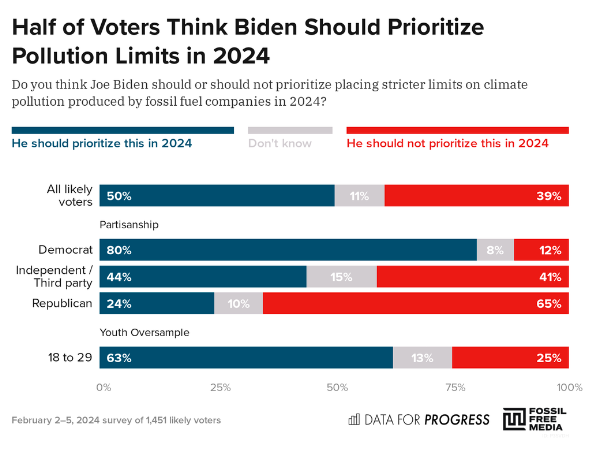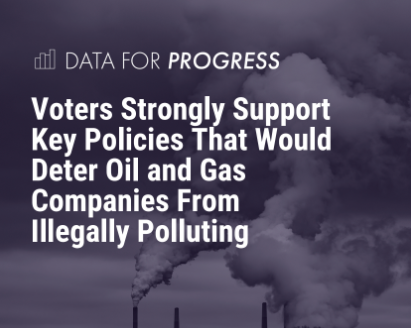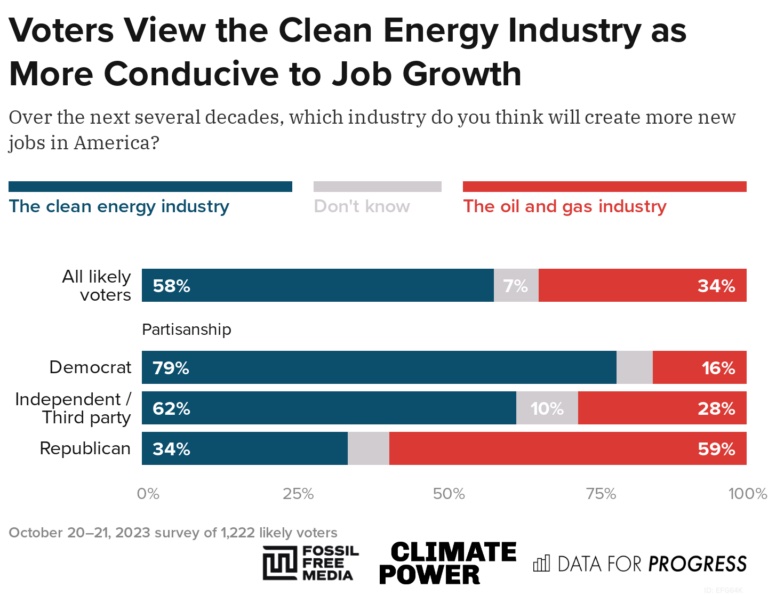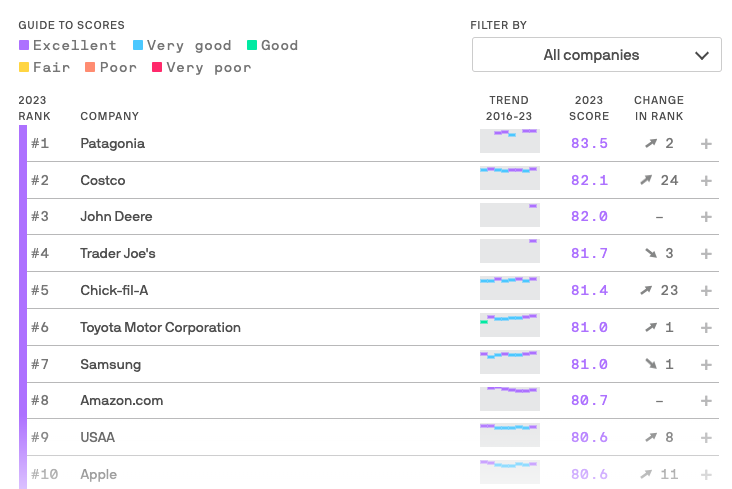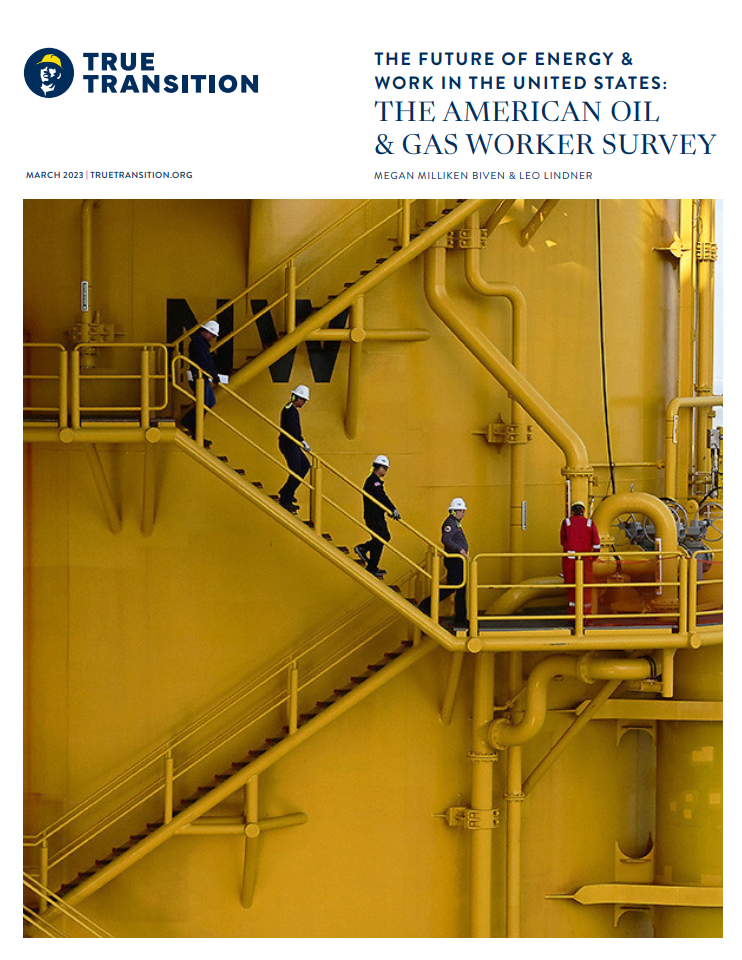Resources
Search below for resources covering the intersection of climate engagement, social science and data analytics.
RESULTS
Environmental Polling Roundup - March 22nd, 2024
This post includes climate and environment headlines, data points, and key takeaways from recent public polls - including newly released polling on the Sackett v. EPA decision and clean water protections, new polling on oil and gas accountability, and a new analysis on the gap between Americans’ interest in climate activism and their actual behaviors.
HEADLINES
Poll: Voters Support Holding Oil and Gas Companies Accountable and Want to See Stricter Pollution Limits
Voters distrust fossil fuel companies and the politicians that they fund, and want to see fossil fuel companies held accountable for their pollution. 84% of voters are concerned about oil and gas companies making large profits while consumers face rising energy bills. 78% of voters agree that “oil and gas companies that knew about the polluting impact of burning fossil fuels, but that intentionally misled the public about it, should be held accountable”.
Poll: Voters Strongly Support Key Policies That Would Deter Oil and Gas Companies From Illegally Polluting
Voters overwhelmingly want stronger accountability for polluters, including compensation for damages to the environment and local communities. Most disapprove of the court decision to block an investigation of environmental injustices in Louisiana’s “Cancer Alley”.
LCV Youth Climate Poll
Young Americans don’t believe the Biden administration has done enough to combat climate change or to hold oil and gas companies accountable. Young Americans particularly want to see the administration close outdated oil and gas pipelines. 64% of young Americans aged 18-34 support closing outdated oil and gas pipelines. 59% of young Americans aged 18-34 support preventing new oil drilling on federal lands and waters. 54% of young Americans aged 18-34 support halting the expansion of methane gas exports. President Biden is deeply underwater with young Americans aged 18-34. This group is twice as likely to say that Biden is doing a “poor” or “not so good” job as president (65%) as to say that he is doing a “good” or “excellent” job (32%). Biden is even further underwater with this group on his ratings for combating climate change (24% excellent or good / 59% not so good or poor) and for holding oil and gas companies accountable (15% excellent or good / 61% not so good or poor).
POLL: Voters Decisively Reject ‘Drill, Baby, Drill,’ Blame Oil & Gas Companies, OPEC+ for High Gas Prices
Polling identified several key lessons for communicators keeping big oil and gas accountable, such as: 1) Making "polluters pay" is a unifying narrative. Framing accountability in terms of the oil and gas industry’s enormous damages to communities and their health, coupled with their inflated profits, can help depoliticize this issue for a wide range of voters. 2) Focus the blame from global context to specific companies. Don’t let big oil and gas use geopolitics as a scapegoat.
Biden’s Fossil Fuel Fail: How U.S. Oil & Gas Supply Rises under the Inflation Reduction Act
The United States’ Inflation Reduction Act (IRA) fails to reduce fossil fuel production or alleviate impact on environmental justice communities. Rather than set the United States on a path toward a managed phase-out of fossil fuels, the Inflation Reduction Act and the Biden administration’s policies are set to lead to a significant increase in U.S. oil and gas extraction and soaring exports. This finding makes a mockery of President Joe Biden’s claims of “climate leadership” and signals that without additional action to constrain oil and gas production, the suffering of oil and gas frontline communities will only grow. Black, Brown, Indigenous, and poor communities, especially in Appalachia, the Gulf Coast, and the Permian Basin, are disproportionately impacted by fossil fuel pollution, climate disasters, and health impacts.
Patagonia tops the list of the country’s most respected brands. Fossil fuel companies - especially ExxonMobil and BP - fare poorly. Patagonia scored 83.5, an “excellent” score. Exxon was 82nd on the list, scoring 68.9, a “fair” score. BP was 92nd, scoring 63.5, a “poor” score.
Poll: Voters Do Not Want New Fossil Fuel Projects Prioritized on Public Lands
President Biden’s ratings on climate and the environment have slipped in recent months among Democrats and young voters. News about the Willow project drops his ratings among Democrats further, as voters - especially Democrats - don’t want to prioritize fossil fuel projects on public lands. By a 56%-35% margin, voters say that the federal government should prioritize clean energy projects over fossil fuel projects when allowing new energy projects on public lands. By an 80%-12% margin, voters support President Biden’s original campaign promise to take action against polluters who knowingly harm the environment or conceal information regarding health risks. By a 57%-32% margin, voters support President Biden’s original campaign promise to ensure a 100% clean energy power sector by no later than 2035.
The Future of Energy & Work in the United States: The American Oil & Gas Worker Survey
Cross sectional survey of 1,635 non-management oil and gas workers in the US revealed new insights and key themes relevant to a truly "just transition" from fossil fuels, including:
How to beat the ‘fracking frenzy’ — lessons from the campaign that ended fracking in Ireland
The successful Irish anti-fracking struggle offers key insights on community power building for anti-extraction movements all over the world. In 2017, community activists in Ireland mobilized a grassroots movement that forced the state to revoke fracking company Tamboran’s license and ban fracking. The first step towards defeating Tamboran in Ireland was building a movement rooted in the local community. Out of this experience, five key “rooting strategies” for local organizing emerged — showing how the resistance developed a strong social license and built community power. First, build from and on relationships. Second, foster ‘two-way’ community engagement. Third, celebrate community. Fourth, connect to culture. Fifth, build networks of solidarity. Four key political strategies include: find strategic framings; demonstrate resistance; engage politicians before regulators; focus on the parliament.
Pagination
- Page 1
- Next page
